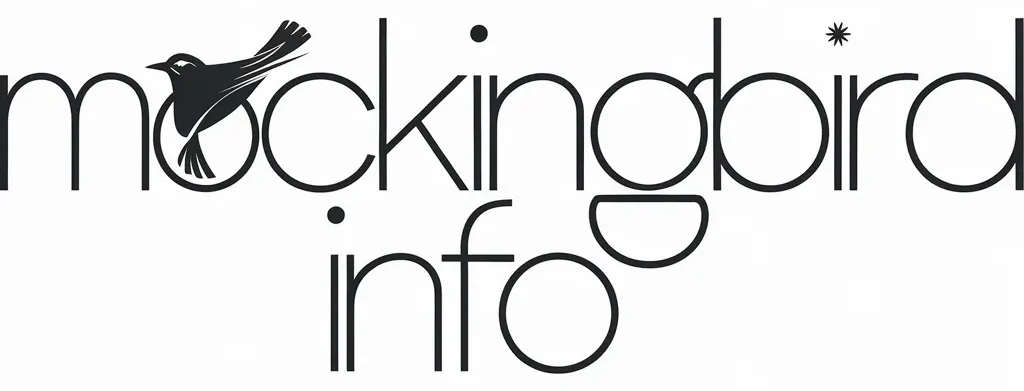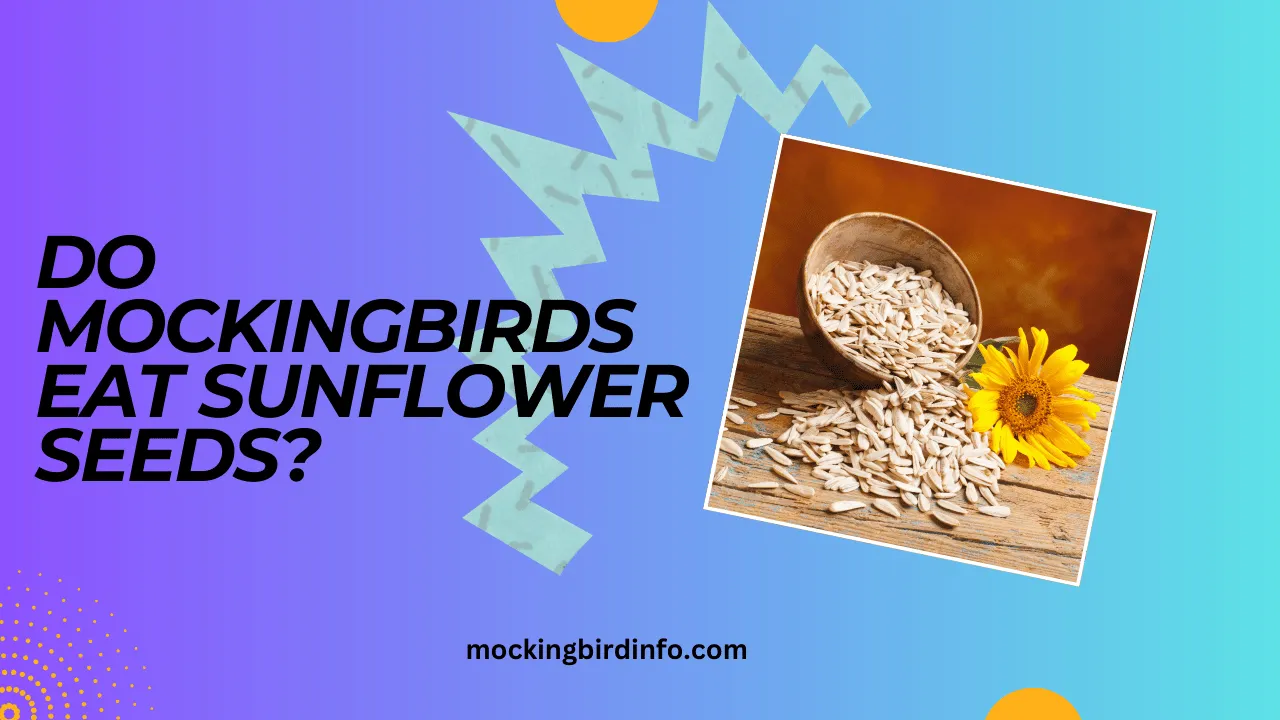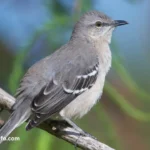Mockingbirds, known for their rich songs and mimicry, are fascinating creatures whose behaviors extend beyond vocal performance.
One of the less talked about aspects is their diet, which, while often overlooked, plays a significant role in their survival and interaction with their environment.
A common question among bird enthusiasts and casual backyard bird watchers is, “Do mockingbirds eat sunflower seeds?” It’s an inquiry that leads to a broader discussion about their eating habits, preferences, and how they adapt to seasonal changes and habitat variations.
Mockingbirds are omnivorous, feeding on a combination of insects, fruits, and occasional seeds. Understanding whether sunflower seeds are part of their diet reveals more about their adaptability, nutrition needs, and how they navigate urban and natural environments.
This topic is especially relevant to those who enjoy bird feeding, as knowing what attracts mockingbirds can help create a bird-friendly space that supports their natural behaviors while benefiting their health.
In this post, we’ll explore the different factors that influence a mockingbird’s decision to eat sunflower seeds, the nutritional impact of these seeds, the risks and benefits associated with feeding them, and the role that human feeding practices play in shaping mockingbird populations.
Whether you’re a bird lover trying to attract these songbirds or simply curious about their diet, this article will guide you through everything you need to know.
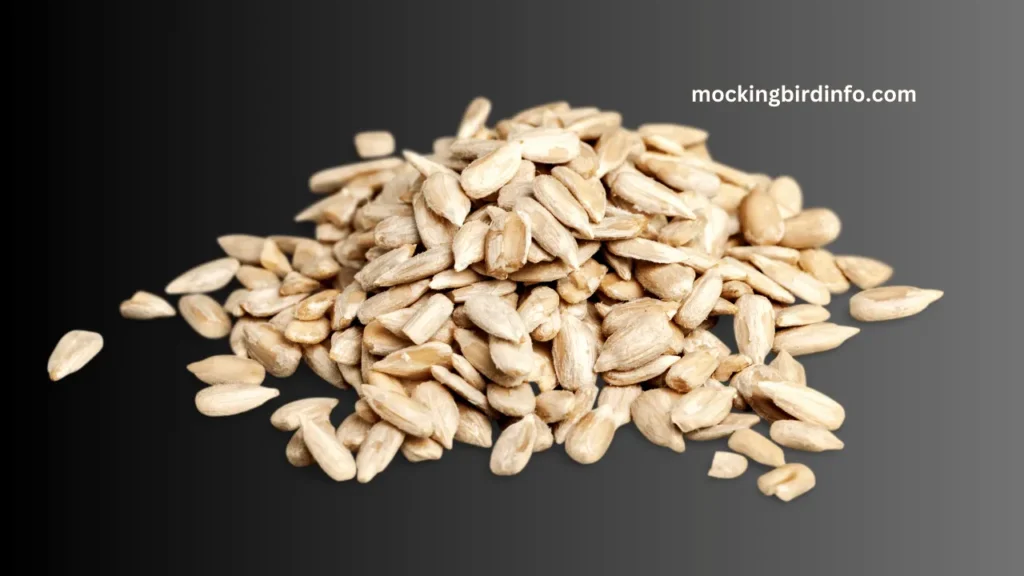
Contents [hide]
- 1 Factors Influencing Seed-Eating Behavior
- 2 Nutritional Value of Sunflower Seeds for Birds
- 3 Impact of Sunflower Seed Consumption on Mockingbird Populations
- 4 Alternative Food Sources for Mockingbirds
- 5 Conclusion
- 6 FAQs
- 6.1 1. Do mockingbirds eat sunflower seeds in the wild?
- 6.2 2. Are sunflower seeds healthy for mockingbirds?
- 6.3 3. Why do mockingbirds eat sunflower seeds from bird feeders?
- 6.4 4. What kind of sunflower seeds should I use for mockingbirds?
- 6.5 5. Is it bad for mockingbirds to depend on feeders?
- 6.6 6. How do I attract mockingbirds without seeds?
Factors Influencing Seed-Eating Behavior
1. Seasonal Availability of Food:
The time of year greatly affects what mockingbirds eat. In warmer seasons, such as spring and summer, mockingbirds have access to abundant food sources like insects, which are high in protein and essential for their active lifestyles and breeding.
During these months, mockingbirds might ignore sunflower seeds in favor of more nutrient-rich insects. However, when fall and winter roll around and insect populations dwindle, mockingbirds must adapt.
This is when they may turn to alternative food sources, such as seeds, to meet their energy needs. Sunflower seeds become a viable option during these colder months, serving as a supplementary food source when natural prey is scarce.
2. Habitat Influence:
Where a mockingbird lives can dictate its diet. Urban and suburban environments are often more limited in terms of natural food sources compared to rural areas. In cities or towns, bird feeders filled with sunflower seeds can attract mockingbirds because they offer an easy source of nutrition when bugs or fruit are less accessible.
Urban mockingbirds, accustomed to human presence, might develop a habit of visiting feeders regularly. On the other hand, rural or forest-dwelling mockingbirds often have access to a richer variety of food sources, such as wild berries and insects, which may reduce their interest in seeds unless other foods are scarce.
3. Individual Preferences:
Not all mockingbirds have the same tastes. Just as some birds may favor insects, others may occasionally develop a preference for seeds, including sunflower seeds. Individual variation in diet can be influenced by age, sex, and prior experiences.
For example, juvenile birds might be more open to trying different foods, while older birds stick to what they know and have relied upon in the past. These preferences can shape how a particular group of mockingbirds interacts with feeders in a given area.
4. Human Interaction:
The presence of bird feeders in residential areas encourages mockingbirds to expand their diets. Human-provided food sources, like sunflower seeds, can be a significant draw for birds that live near people.
This interaction can be positive, as it provides birds with a reliable food source during tough seasons, but it can also have negative implications, such as dependency on feeders and a decrease in their natural foraging behaviors.
Nutritional Value of Sunflower Seeds for Birds
1. High Protein and Fat Content:
Sunflower seeds are nutrient-dense, containing a high level of protein and healthy fats. For mockingbirds, this makes sunflower seeds an excellent supplemental food, especially during winter.
The protein content helps maintain muscle health, while the fats provide a concentrated energy source that is crucial for birds needing to stay warm and active during colder months.
This nutrient combination supports energy metabolism and aids in maintaining body condition when other high-protein foods like insects are not available.
2. Energy-Dense Food for Survival:
The fat found in sunflower seeds is a key energy source, making these seeds especially valuable during cold weather when birds require extra calories to maintain body heat.
Energy-dense foods allow birds to exert less energy foraging, helping them sustain their activity levels throughout the day.
This energy boost is critical for winter survival when food is harder to come by and birds need to conserve their resources.
3. Potential Drawbacks of Seed-Heavy Diets:
While sunflower seeds can be beneficial, a diet overly reliant on them can lead to nutritional imbalances. Seeds do not provide the comprehensive vitamins and minerals that a balanced diet with fruits and insects would.
Additionally, excessive consumption of sunflower seeds can contribute to obesity in birds, potentially impacting their agility and overall health. For mockingbirds, the key is balance; sunflower seeds should supplement a diet rich in other natural foods rather than replace them.
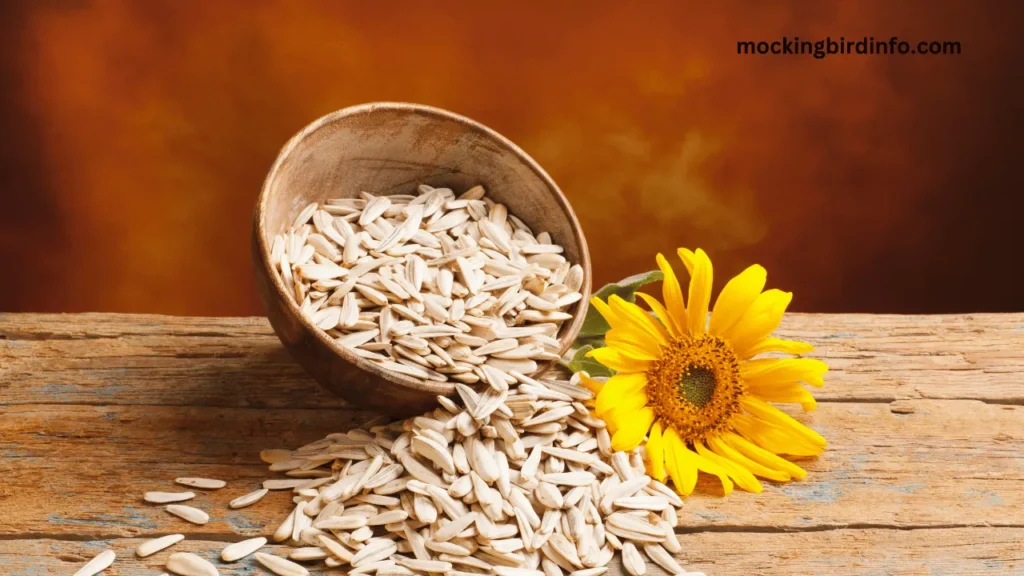
Impact of Sunflower Seed Consumption on Mockingbird Populations
1. Dependency and Behavior Changes:
A significant concern with sunflower seed consumption is the potential for birds to develop a dependency on human-provided food.
While this can provide a safety net during harsh conditions, it can also lead to a shift in natural foraging behaviors.
Mockingbirds that rely on feeders might become less inclined to search for food in their environment, impacting their ability to adapt if feeders are removed or food sources change.
2. Competition Among Bird Species:
Bird feeders that offer sunflower seeds attract a range of bird species, not just mockingbirds. This can create competition for food, particularly with more aggressive or numerous bird species like sparrows and starlings.
Mockingbirds, although territorial, may be pushed away from feeders by larger or more assertive birds, impacting their ability to secure enough food from a shared resource.
3. Disease Transmission at Feeders:
Another risk associated with bird feeders is disease transmission. Crowded feeding areas can become breeding grounds for avian diseases, such as salmonella or avian pox.
Mockingbirds that frequent feeders where many birds gather are at higher risk of contracting and spreading these diseases. This poses a potential threat not only to individual birds but to local populations if an outbreak occurs.
Alternative Food Sources for Mockingbirds
1. Insects and Small Invertebrates:
Insects make up a significant portion of a mockingbird’s diet, especially during the breeding season, when protein is vital for growth and reproduction.
Homeowners can support local insect populations by planting native plants that attract bugs or avoiding pesticide use. This will naturally draw mockingbirds to your garden, providing them with the protein they need.
2. Fruits and Berries:
Fruits are an essential part of a mockingbird’s diet, offering vitamins, minerals, and hydration. Planting trees and shrubs that bear fruits like holly, mulberries, or elderberries can provide a sustainable and attractive food source for these birds.
These plants can also encourage year-round visits from mockingbirds, especially during times when insects are not as readily available.
3. Water Access:
Mockingbirds, like all birds, require clean water for drinking and bathing. A birdbath or water feature in your yard can attract mockingbirds and other bird species.
Access to water not only supports hydration but also helps with activities like bathing, which keeps their feathers in optimal condition for insulation and flight.
4. Native Plants:
Planting native vegetation can offer food and shelter, mimicking the natural environment and promoting the presence of insects and fruits. This approach supports biodiversity and helps create a balanced ecosystem that benefits mockingbirds and other wildlife.
Conclusion
Mockingbirds are remarkable birds with versatile feeding habits that allow them to adapt to different environments and seasonal changes.
While they do eat sunflower seeds, especially when other food sources are limited, these seeds should be a supplemental part of their diet, not the mainstay.
Sunflower seeds offer valuable nutrition, particularly during winter when birds need extra energy, but over-reliance can lead to potential health issues. Understanding the balance between providing food through bird feeders and promoting natural foraging habits is crucial.
To truly support mockingbirds and enhance their well-being, consider planting native fruit-bearing plants, providing clean water sources, and maintaining an environment that encourages insects.
This balanced approach can help you attract mockingbirds to your space while respecting their natural dietary patterns and promoting ecological health.
FAQs
1. Do mockingbirds eat sunflower seeds in the wild?
Typically, no. They prefer insects and fruits in the wild, but they may eat seeds if other food sources are scarce.
2. Are sunflower seeds healthy for mockingbirds?
Yes, but only as a supplement. They provide protein and fat but lack other essential nutrients found in a varied diet.
3. Why do mockingbirds eat sunflower seeds from bird feeders?
Urban mockingbirds may rely on feeders, especially during seasons when natural food is less abundant.
4. What kind of sunflower seeds should I use for mockingbirds?
Black oil sunflower seeds are preferred due to their higher nutritional value and easier shell cracking.
5. Is it bad for mockingbirds to depend on feeders?
While it can be helpful during tough times, over-dependence can alter natural foraging behavior and adaptability.
6. How do I attract mockingbirds without seeds?
Plant fruit-bearing plants and maintain a pesticide-free yard to attract insects.
